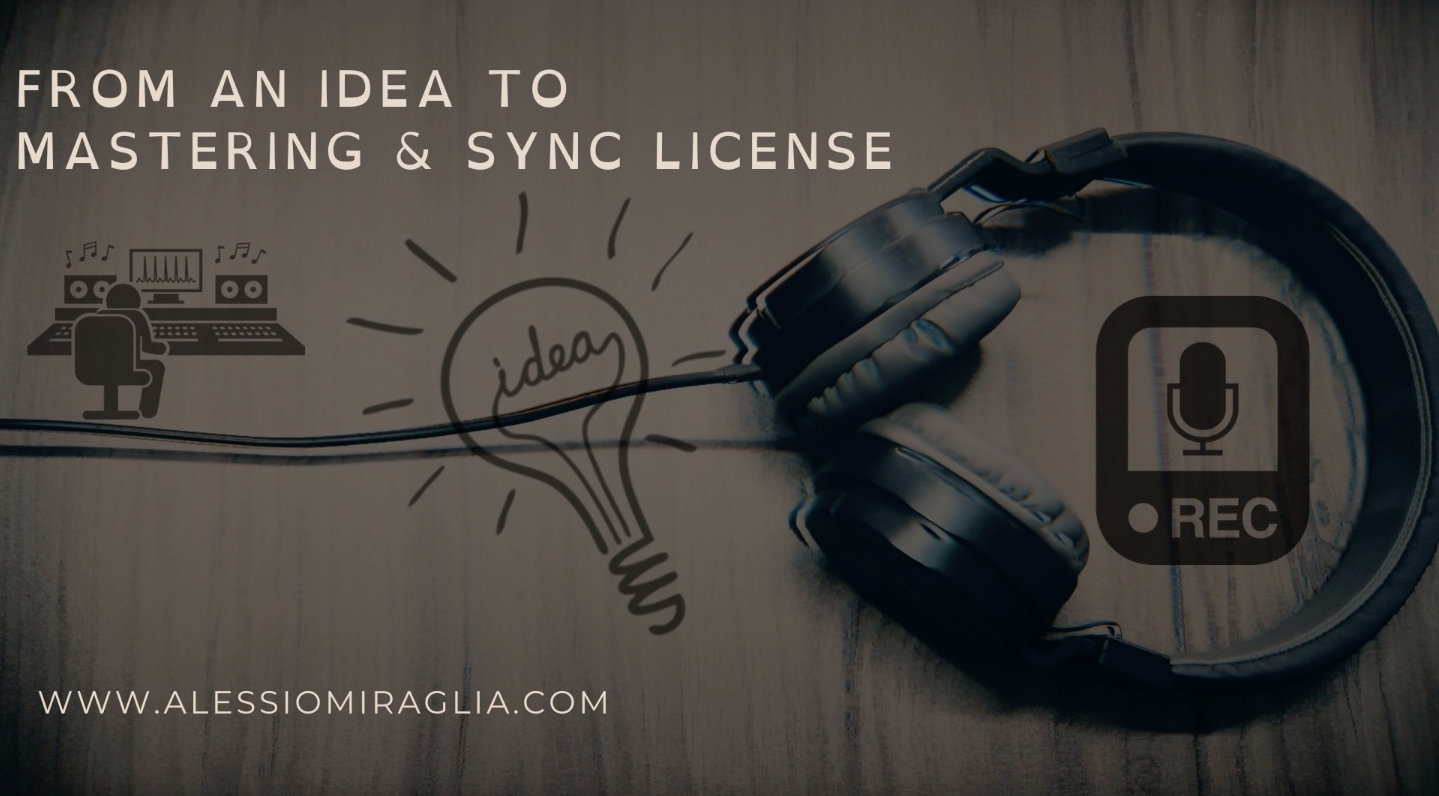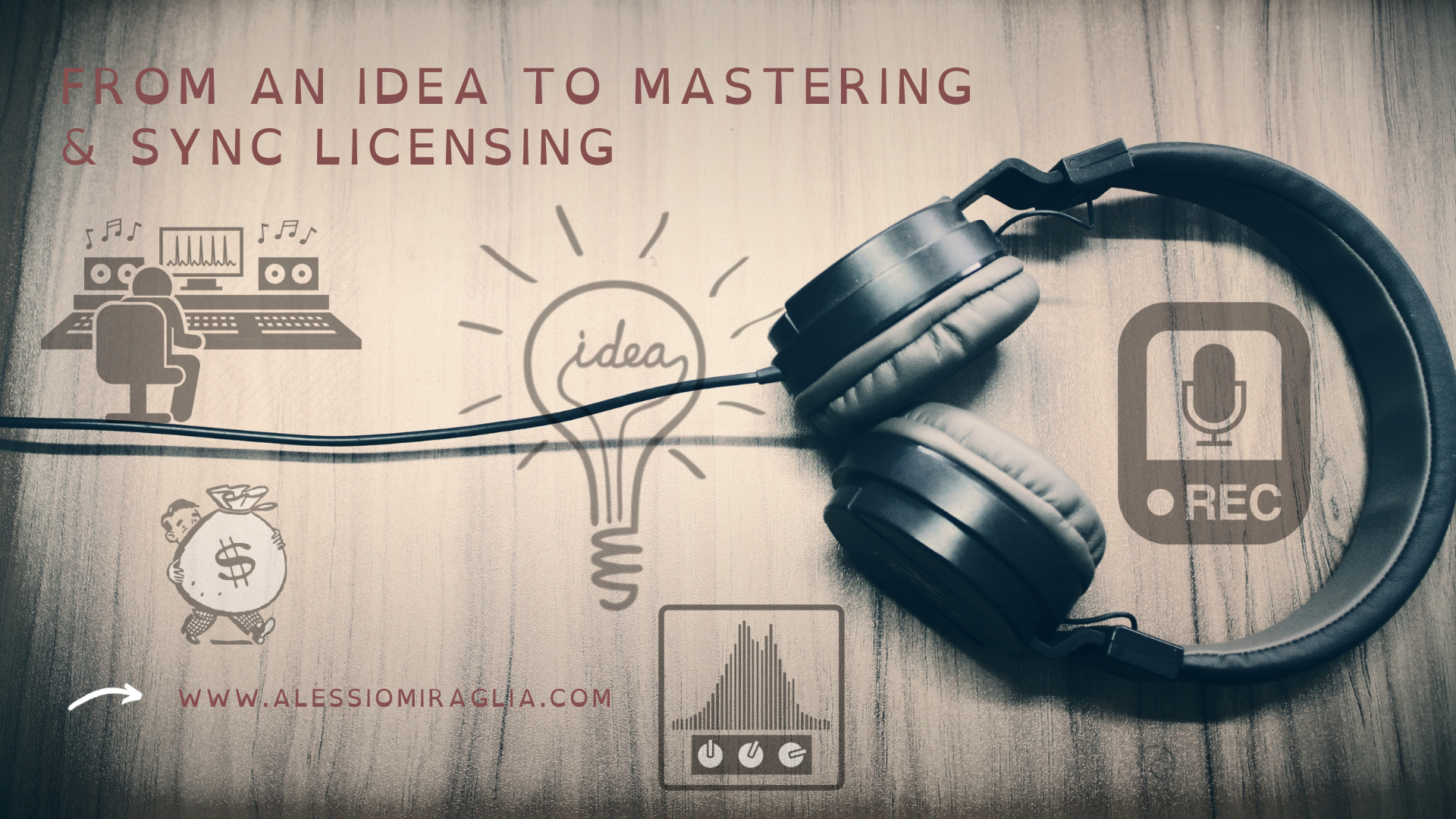BECOME A MUSIC PRODUCER
Whether you want to work in music production, composer and post-production for film or TV, live sound, radio broadcasting, sound design, game sound, podcast audio, or in one of the many different areas of the audio industry, this course gives you the knowledge and practical skills needed for a successful career.
The full-time course consists of 1 lessons per week and the total duration of the course is 5 months.
Each lesson has a duration of 1 hour.
In addition to lessons, students have to complete a series of practical exercises and assignments per week.
Arrangement & Music analysis
A. M.’s unique approach to Music Composition shows you how it is so amazing to create a song starting from a simple idea and develop your personal inspirational journey. You’ll learn how to add hooks, riffs, chords, basslines, melodies, develop your arrangements to your original idea, and work with vocals and effects. We’ll analyze and breakdown massive tracks and artists in a wide variety of styles.
- Approaches to Writing
- Extending Music Theory
- Structure & Track Analysis
- Extra Musical Touches & Arranging
- Applying Vocals
- Finishing Tracks
- Production & Creative Effects
Advanced Composition
Advanced Composition is designed to develop your compositional skills by drawing on diverse techniques and traditions that will add character and depth to your tracks. You will be encouraged to fuse styles to create your own unique musical signature and to deconstruct music to understand how the elements in great tunes work together. This module will equip you with a deep understanding of the advanced tricks and theories that form the mysterious world of music composition.
- Advanced Harmony
- Composition Deconstructions
- Noise, Samples & Non-Harmonic Sound
- Fusing Musical Styles
- Comparing Music Genres
- Advanced Rhythm
Art of Mixing
Detailed and comprehensive, the Art of Mixing module is designed to equip you with the skills of an advanced mix engineer and features real multi-tracks in a range of musical styles. Art of Mixing is taught on ProTools, it’s jam-packed full of classic and cutting edge mix techniques and contains practical video tutorials including some very special exclusives with top industry professionals sharing their own mixing tips, tricks, and techniques. Balancing, panning, aural perception, EQ, compression, limiting, gates, and effects are covered in detail. You will also learn to listen to music from a critical perspective and understand the science behind the sound.
- The Mixing Environment & Critical Listening
- Starting a mix
- Controlling Dynamics
- Separation in the mix – EQ
- Space & Depth – Reverb
- Delays & related effects
- Creative Mixing
- Mixing Vocals
- The Mix Process
- Complete Mix Walkthroughs
- Basic Mastering
Advanced programming techniques
This module covers advanced programming techniques such as adding feels, creating variations, automating sounds; working in percussion; glitching; synthesis fundamentals; creating riffs; vocals; effect design – Rises & Falls; sidechain compression; slicing audio and feedback FX. These techniques can be applied to a wide range of music styles.
- Creating Drum Sounds
- Programming Drums & Percussion
- Sound Design
- Basslines
- Melodic Elements & Vocal Hooks
- Developing Musical Ideas & Effects
- Building Sections & Adding Hooks
- Working with Vocals
- Editing, FX & Structure
- Trade Secrets & Finishing Touches
- Arrangement & Mixdown
Mastering
You learn to develop/tune your ears, find out about mastering EQ, compression (including multi-band), limiting, mid/side processing, and more. You can master your own music as part of this course. This module is taught using a variety of different platforms and plugins, and the skills you learn can be applied to any mastering environment.
- Mastering Process & Sound Theory
- Digital Audio Theory
- Monitoring
- Workflow, Phase & Metering
- Frequency Spectrum & EQ
- Dynamics: Compression, Limiting & De-Essing
- Dynamics: Multiband & Parallel
- Mastering in Action
- Audio Restoration & Noise Reduction
- Level & Tonal Coherence
- Album Work
- Mastering for Different Media
Music Licensing & Sync
We’ve taught thousands of students here on Udemy and in this course you will learn the basics of music licensing and how we got our music placed in TV Shows shown around the world.
Some of the topics covered include:
- What is music licensing and how it works
- What is music publishing and how it works
- How to get your music ready for placement opportunities
- How to increase your chances of getting placements
- The art of making connections
- And who and where to submit your music
- Gain Knowledge on how to build your own professional Music Catalogue for Tv and Film.
Who this course is for:
- • This course is made for who wants to become music producer, songwriter, and recording artist getting music placed in tv and film.
(MORE FIELDS…)
Principles of Sound and Audio Practice
You will be introduced to the concept of sound as a physical phenomenon and shown how to protect its behavior by exploring maths and physics concepts, which will support your learning throughout the rest of the course. You will then focus on the fundamental principles of audio production, including the theory and practical application of EQs, dynamics processors, and effects. This critical foundation will enable you to grasp the concepts of signal routing, microphones, and loudspeakers, providing you with the basic skills to operate in a professional audio environment.
Introduction to Academic and Professional Practice
In this module, we introduce you to proven concepts and routines of academic research, critique, and writing, and nurture these skills to ensure that you apply good study practice and management throughout your studies. We aim to familiarise you with the theories of culture and communication and develop a basic understanding of the creative media practitioner. Together, all of these skills will help you develop transferable career skills to aid your job search upon graduation.
Audio Production
This module takes your knowledge to the next level as we prepare you for studio work in the industry. You will develop professional practice in the planning and execution of a recording and mixing project, quickly becoming familiar with working in front of a recording console and using outboard gear and software plugins.
Multimedia Sound
The aim of this module is to provide you with a wide range of professional tools and techniques utilized in the production of audio for multimedia applications. It focuses primarily on audio preparation for different media, including visuals and interactive environments. This module aims to enable you to explore your own interests and develop an individual design aesthetic within audio, whilst also providing an overview of possible career paths within the field.
Marketing, Business Planning, and Law
This module aims to impart the essential knowledge, concepts, and analytical tools of business and marketing to function effectively in the industry. It will also open your eyes to key legal and ethical issues that underpin practices specifically related to the creative media industries. Upon completion of this module, you will have developed key communication skills, whilst being sensitive to the impact of how communication can shape how we, as a society, understand each other in social, cultural, and economic contexts.
Research Practice and Society
Research is key to the successful outcome of any creative project and this module aims to develop within you an advanced critical understanding of qualitative and quantitative research methodologies and their application for both artistic and scientific research. You will advance your knowledge, planning, and implementation of research-based inquiry to address specific questions, whilst developing an in-depth understanding of the creative media industries and your potential role as a creative media practitioner. Together we will broaden your understanding of the ongoing interplay between science and the history of ideas, culture, and creative media, to give your work the depth it requires to have a profound effect in the market-place.
What you will need for this program
Software Requirements
- Any DAW (Pro Tools, Logic, etc.)
Mac Users
- OS X 10.9 Mavericks or higher (click here for system requirements)
- Latest version of Google Chrome
Windows Users
- Windows 7 or higher (click here for system requirements)
- Latest version of Google Chrome
Hardware Requirements
- High quality audio interface, with a recommended minimum of 2 inputs (Focusrite, Behringer, Apogee, MOTU, etc.)
- MIDI controller (M-Audio, Akai, etc.)
- Professional pair of speakers
- Professional pair of headphones
- 50 GB free hard drive space
- Webcam
- Internet connection with at least 4 Mbps download speed (http://www.speedtest.net to verify or download the Speedtest by Ookla app from your mobile app store)
General Course Requirements
Below are the minimum requirements to access the course environment and participate in live chats.
Please make sure to also check the Prerequisites and Course-Specific Requirements section above, and ensure your computer meets or exceeds the minimum system requirements for all software needed for your course.
All Users
- Latest version of Google Chrome
- Zoom meeting software
- Webcam
- Speakers or headphones
- External or internal Microphone
- Broadband Internet connection


